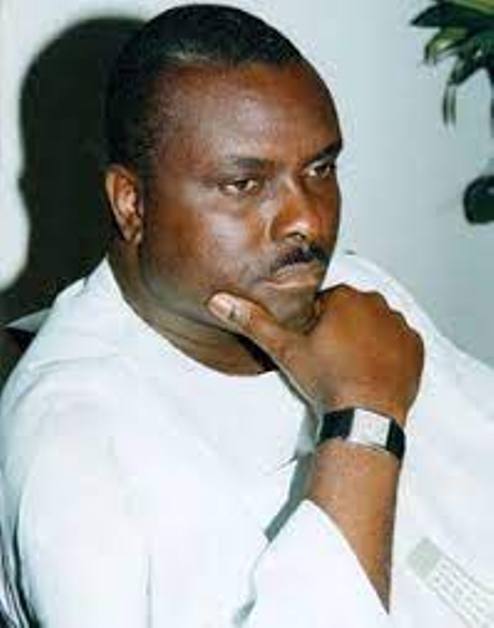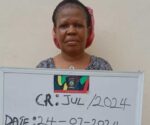The Travail Of Ibori And Desperation Of UK Court Judge
By Erimeruke Okome
LAGOS AUGUST 2ND (NEWSRANGERS)-But for the timely, professional intervention of his immigration lawyer, Mr Ian Macdonald QC, and the grace of two virtuous women, Her Ladyship Mrs Justice May and Her Ladyship Mrs Justice Cheema-Grubb DBE, former Delta State governor, Chief James Onanefe Ibori would still be in a United Kingdom (UK) prison today, seven years after completing his sentence.
His was such a case in which he had to go to court to compel highly interested parties to release him from prison even after serving his term, in what knowledgeable insiders now describe as prosecution turned full blown persecution.
The story of Ibori’s travails in the UK is a chilling study of how to walk the fine line between prejudice and the law, especially for a judge with an apparent axe to grind and who gave the prosecution team such a free pass that observers described the proceedings in his court as a near travesty.
The Judge, Mr David Tomlinson, was clearly angry with Ibori all through the trial, and he did not hide it. And because of this, “every fair, reasonable and proper defence submission was met with disparaging and cynical resistance,” said a senior member of the English Bar who observed the proceedings.
According to this source, who was in court all through the case, Judge Tomlinson’s one mantra was that Ibori did not himself give evidence, yet his legal team consistently showed up, and reportedly consistently undermined the prosecution’s case time and time again.
This source disclosed that the “prosecution’s evidence was tissue thin, and to anyone in the courtroom, the deep racial prejudice Ibori faced was visible and apparent at every stage.”
“The Judge readily acceded to any argument the Prosecutors, Jonathon Kinnear and Micheal Newbold, made; routinely nodding and engaging in jovial banter and dialogue with Kinnear as friends while generally mocking the defence’s submissions.”
Prosecutor Kinnear took full advantage of the Judge’s open camaraderie. He changed arguments flippantly. And with the defence’s objections casually and consistently overruled, he more often than not, took complete leave of the facts, and embarked on voyages unknown to the matter at hand.
“He(Kinnear) kept grinning to all knowing that the Judge’s prejudice was on his side, especially after the Judge openly told the court – ‘I trust Mr Kinnear and Mr Newbold’, implying he had no trust in the defence counsel.”
Ibori’s counsel in the main trial was Nick Purnell, QC. For a little bit of background, Purnell is a former Treasury Cousel with over 45 years in the bar. A one time prosecutor, he is reputed to be one of the best criminal lawyers in the UK.
Purnell had advised Ibori to take a plea deal once he noticed the conspiratorial and politically charged atmosphere of the trial. The issues at stake were tendentious. The case itself on the one hand was already taking a life of its own with the heavy local and international attention it had garnered.
For one, the UK Department for International Development, DfID, which had launched an anti corruption campaign targeting third world nations 10 years before, was determined to make the case a shining example of its achievements.
The BBC reported that ” DfID funded a team of Scotland Yard officers specifically to get Ibori extradited to the UK for a trial designed to send a message to corrupt officials in Africa.
The International Development Secretary at the time of Ibori’s conviction, Andrew Mitchell, said the sentence sent ‘a strong and important message to those who seek to use Britain as a refuge for their crimes’”.
But while DfID was fighting corruption abroad, news hit of corruption at home, within the UK Metropolitan Police that was investigating Ibori.
To paraphrase the BBC, while the conviction of Ibori was the prize for a government anti-corruption campaign initiated by the Department for International Development (DfID),
Det Sgt John McDonald, who headed the police investigation was accused of receiving payment in return for providing information about the case.
Det Sgt McDonald was removed from the National Crime Agency’s International Corruption Unit, where he had been on secondment. He was returned to the Met, where a review of his status was instituted.
Wrote the BBC: “The Crown Prosecution Service, CPS, also replaced the prosecution team involved in ongoing cases connected to the Ibori affair, although it stressed the lawyers still retained its full confidence. “
Purnell, Ibori’s lawyer, keenly aware of the entirely toxic environment the case had descended into, asked his client to take a plea deal. Ibori was informed in unmistakable terms that if he allowed the case to go through the entire rigour of trial, he probably would get between 30 years to life. However, if he cut short the process and pleaded guilty, he would come away with “3-4 years max. “
By his lawyers’ calculations, he probably would end up serving only a very short term, or even no time at all, if the time spent in detention was factored in.
Ibori reluctantly accepted. His reluctance was based on the fact that the plea would presuppose guilt, even when the prosecution’s case was at best fragile. Sources close to him say what changed his mind was the aspect of the charges that had to do with money laundering, given the tradition of Nigerians to carry out many transactions in cash given the weakness of the country’s financial system.
He pleaded guilty. And against all expectations, was hit with a 13year sentence!
If Ibori was stunned, his lawyer was even more shocked. When the trial concluded, Purnell wrote his client, lamenting the unfairness of the trial and sentencing, adding instructively, that in all his four decades at the bar, he had not encountered a trial of that nature.
Ibori was hurt, but he diligently served out his sentence, helpless as it were against the might of the British legal system. He was due to be released on Tuesday, December 20, 2016, after serving six years. The abridgement was consequent upon fact that he had been held for a considerable time in the United Arab Emirates pending his extradition to the UK for trial.
Over a year before his release was due, the Secretary of State for Home Department (SSHD) had made an order for an already homesick Ibori’s deportation. It was good news, because he was anxious to leave the UK and return to Nigeria.
But as the date for his release drew near, the Secretary of State appeared to ‘change her mind,’ revising the decision to deport, pending the outcome of confiscation proceedings which followed the conviction.
At this point, the general plan was to keep Ibori in prison until those proceedings were completed, and it is interesting to note that the process concluded only last week, seven years after!
Ibori’s immigration lawyer, McDonald, who understood the game that was being played, swiftly went to court to demand freedom for his client.
No one captured the absurdity of the situation better than Mrs Justice May of the Royal Courts of Justice, Strand, who heard Ibori’s case. She noted that for reasons which could not be immediately detailed, “those consfication proceedings are nowhere near concluded and will not be concluded anytime in the near future.”
She pointed out that there were all sorts of delays occasioned by matters coming to light concerning the prosecution of the offences. Also, she noted, there was the likelihood of outstanding appeals in respect of the conviction of Ibori, and others. For those reasons, she maintained quite correctly, the consfication proceedings were unlikely to be concluded in the foreseeable future.
In her view, evidence showed that “the Crown Prosecution Service (CPS) did not have any interest in whether Ibori stayed in the UK or not,” and therefore expressed surprise that the Secretary of State appeared to have taken it upon herself to ensure that Ibori stayed in UK pending the conclusion of consfication proceedings.
This she said, was “in apparent contradiction with her intention, as communicated to Ibori earlier, to deport him as soon as possible”.
And because Ibori remained illegally detained after completing his sentence, Mrs Justice May ordered for his release, noting that it was not proper for her to use her immigration detention powers to hold him (for as it has now turned out, an additional seven years) awaiting the outcome of consfication proceedings.
Ibori returned to Nigeria to a hero’s welcome in 2016. To his thronging supporters, especially in his home state Delta, a good man, friend, brother and leader was back. The adulation was infectious, almost unbelievable. But those who know what Ibori means to Delta were hardly surprised.
They knew that in spite of the litany of allegations against him, he was the poster boy of development among his people. They also knew that no government before his, or with the benefit of recent hindsight, after his, had brought such great improvements, even with the comparatively limited resources available then.
Knowledgeable observers also knew that whatever Ibori was accused of wouldn’t have survived a dispassionate unbiased inquiry. They also realized that Ibori’s error was his decision to take the quick way out at the suggestion of his trusting counsel, only to be ambushed by a vengeful judge.
In spite of these, the Delta leader returned home and determinedly kept a low profile. This was not until his old friend and colleague, Asiwaju Bola Ahmed Tinubu, was elected president of Nigeria.
All it took were two visits to the Presidential Villa and a flurry of media reports for the forfeiture proceedings which dragged for seven years in the UK to come to a sudden conclusion.
And in those proceedings last week, Judge Tomlinson struck again!
Sitting at his Southwark Crown Court last Friday, he held that he has made “factual findings” about the forfeiture and made a fresh formal order to compel Ibori to refund a further £101.5million.
Kinnear, yes, the same one, had told the court just a day before that the total amount of money that should be confiscated from Ibori was £101.5 million, adding for full effect that Ibori risks a fresh five to 10 years prison sentence should he fail to pay.
Ibori’s reaction was poignant, even if pained.
He said: ” Albert Einstein is quoted as saying that the ‘definition of madness is doing the same thing over and over again and expecting a different result’.
“If that is true then I must be going mad because in over a decade since the British Courts have been persecuting me and those close to me, I kept believing that justice and fairness would eventually triumph.
” In hearing after hearing through the years, despite some of the most logic defying rulings against me- I still believed. Despite clear evidence of police corruption against the main officer in my case (evidence so strong that it caused the lead prosecutor to resign from my case), I still believed. Despite a clear victory in my 2013 confiscation hearing which left the Judge unable to make an order against me, only to have him rule that the prosecution should start the trial afresh some years later – I still believed.
“However, today’s ruling from Judge Tomlinson is difficult to comprehend and even harder to accept.
“I have to move past the fact that the British Courts found themselves competent to sit in Judgment over contracts awarded in Delta State; contracts that were legitimately awarded and completed.
“I have come to accept my fate despite the inability of the British prosecutors to show any evidence whatsoever of monies defrauded or indeed missing from Delta State.
“Since 2005, the British Prosecutors have investigated my assets worldwide; they have had a restraint order in place on most of those assets and they are well aware that the total monetary value of those assets is nowhere close to the sums that were the subject of today’s Order.
“Notwithstanding the fact that many of the assets are not and have never been owned by me – it seems that if you are my friend and you allowed me to spend some holiday time in your house, then by this order I now own your home and must ask you to sell it to satisfy the Order.
” The Order made today is to be paid immediately, this was made in the full knowledge that it could take many months to actually realise the sale of many of these assets.
“There is an eight year default sentence, which means that if I do not co-operate and pay nothing at all, then the prosecution can apply for the imposition of the default sentence. However as the prosecution already has a Restraint Order over the assets – the situation of my not co-operating or paying should not arise.
” However, an issue arises if my Restrained Assets are sold, and the total realised from the sale does not equal the amount in the Order, then the Prosecution can still apply for part of the default sentence to be applied, but they could only ask for a sliding scale reduction of the eight years default sentence based on the amounts that remain outstanding.
“If such an application were to be made it would be vigorously contested. In the normal course of events any talk of a default sentence would normally be stayed until any outstanding Appeal has been concluded.
“The Judge in this case has appeared to have cast aside any pretence of impartiality and has made an Order which is both wholly unrealistic and unrealisable. He has completely disregarded any arguments, evidence or expert witnesses in my favour. It was apparent during these last two days that he has forgotten many of the important elements of the case which is unsurprising as it almost two years since the case concluded.
“It has taken him two years to write this Judgment and in the interim he has presided over hundreds of cases, but I refuse to make excuses for him.
“At this point in time words fail me and so the question for me as I take my case to the Court of Appeal, is, if I continue to believe that I may finally get some Justice, is this the definition of madness? I know one thing for sure, that if I do not go to the Court of Appeal to contest this outrageous Order the people will definitely say that I am a madman!”
Dr. Okome is the President of Niger Delta Patriots, NDP.





















